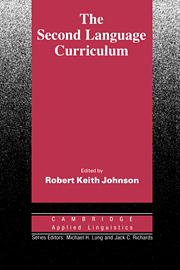Book contents
- Frontmatter
- Contents
- Contributors
- Series editors' preface
- Acknowledgements
- Overview
- I 1 CURRICULUM OVERVIEW
- I 2 CURRICULUM PLANNING
- II ENDS/MEANS SPECIFICATION
- III PROGRAMME IMPLEMENTATION
- Chapter 7 Faculty development for language programs
- Chapter 8 The evolution of a teacher training programme
- Chapter 9 Appropriate design: the internal organisation of course units
- Chapter 10 Beyond language learning: perspectives on materials design
- IV CLASSROOM IMPLEMENTATION
- V EVALUATION
- Bibliography
- Index
Chapter 10 - Beyond language learning: perspectives on materials design
Published online by Cambridge University Press: 05 October 2012
- Frontmatter
- Contents
- Contributors
- Series editors' preface
- Acknowledgements
- Overview
- I 1 CURRICULUM OVERVIEW
- I 2 CURRICULUM PLANNING
- II ENDS/MEANS SPECIFICATION
- III PROGRAMME IMPLEMENTATION
- Chapter 7 Faculty development for language programs
- Chapter 8 The evolution of a teacher training programme
- Chapter 9 Appropriate design: the internal organisation of course units
- Chapter 10 Beyond language learning: perspectives on materials design
- IV CLASSROOM IMPLEMENTATION
- V EVALUATION
- Bibliography
- Index
Summary
In this paper we want to set out a number of perspectives on materials design which focus on learning outcomes other than those relating to the acquisition of the second/foreign language. The idea of looking beyond the immediate, stated objectives of educational materials is not a new one. Dewey, for example, remarked in 1938:
Perhaps the greatest of all pedagogical fallacies is the notion that a person learns only the particular thing he is studying at the time.
(1938:48)More recently, however, Jackson (1968) has introduced the idea of a ‘hidden curriculum’ within teaching, referring to learning outcomes apart from those intended in the ‘manifest curriculum’. Similar ideas have been expressed by a number of other writers, who see a ‘sub-surface’ (and frequently pernicious) element to teaching or teaching materials. Freire (1972), for example, is in no doubt as to the ‘philosophy of man’ projected by conventional approaches to adult literacy:
We begin with the fact, inherent in the idea and use of the primer, that it is the teacher who chooses the words and proposes them to the learner. Insofar as the primer is the mediating object between the teacher and the students, and the students are to be ‘filled’ with the words the teachers have chosen, one can easily detect a first important dimension of the image of man which here begins to emerge. It is the profile of a man whose consciousness is ‘spatialized’, and must be ‘filled’ or ‘fed’ in order to know.
(1972: 23)- Type
- Chapter
- Information
- The Second Language Curriculum , pp. 155 - 175Publisher: Cambridge University PressPrint publication year: 1989
- 17
- Cited by



